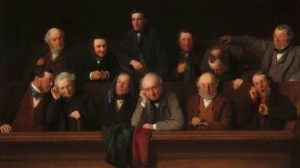On January 12th, the U.S. Supreme Court issued its opinion in Hurst v. Florida, a death penalty case. Writing for an eight-justice majority, Justice Sonya Sotomayor continued a line of recent Supreme Court rulings that is re-asserting the role of juries under the Sixth Amendment.
In all criminal prosecutions, the accused shall enjoy the right to a speedy and public trial, by an impartial jury
U.S. Const. amend. VI.

Florida state law provided that, following a defendant’s conviction in a capital case, the judge conducts an evidentiary hearing, and then the jury, by majority vote, gives an “advisory sentence.” The judge then independently decides whether or not the evidence meets the conditions for imposing a death sentence under Florida law.
Recent Supreme Court rulings have promoted a new turn of Sixth Amendment jurisprudence. In 2000, the Court in Apprendi v. New Jersey considered the case of a defendant, convicted by a jury of shooting into the home of an African-American family, who had his sentence increased by a judge’s independent finding that the crime was racially motivated. The Apprendi Court held that the Sixth Amendment demands that any factual element relied upon to increase a defendant’s punishment must be found by a jury.
In Ring v. Arizona (2002), the Court first applied its Apprendi reasoning to a death penalty case. Arizona’s capital sentencing scheme allowed juries to reach decisions of guilt or innocence, but required judges to make independent findings on factors that might determine a penalty of death. The Ring opinion found that this process violated the Sixth Amendment.
With Hurst, the Court has again demonstrated the breadth of its Apprendi-Sixth Amendment rule. Justice Alito, in dissent, urged the Court to declare the error harmless, suggesting that the jury’s advisory sentence reflects what it surely would have issued if it had been charged to render a determinative verdict. Instead, the Court sent the case back down for the lower court to decide the question. And if the lower court finds the error to be harmless, then Hurst will remain on death row.